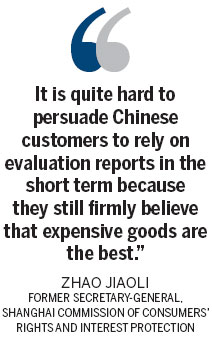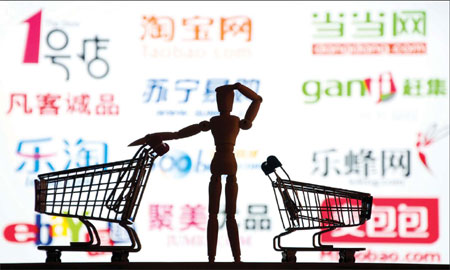Wisdom from oracles of shopping
Updated: 2013-07-12 08:49
By Yu Ran (China Daily)
|
|||||||||||
|
Third-party platforms have been launched to provide detailed comparisons between products. Provided to China Daily |

Parents are Being offered advice on what to buy for their babies, but are Chinese consumers listening?
As more Chinese consumers become aware of the wider range of shopping choices available to them, some business people are seeing a market for independent advice that can help shoppers decide where to spend their money.
One of those that has sensed the opportunity is MingJian, a website that compares popular babies' and children's products. (MingJian means judging things objectively and fairly.)
"MingJian is committed to helping customers to make better-informed purchase decisions through independent, expert, impartial research and testing of products and services," says James Feldkamp, co-founder and chief executive officer of MingJian.
But as grand and noble as that idea may sound, not all are convinced that it will fly in China.
In developed countries such as the United States and Britain, such reports issued by third-party organizations are important reference points for shoppers.
Being the only Chinese member of International Consumer Research and Testing, MingJian is keen to introduce the daily pre-buying habits from overseas to the booming Chinese market.
A group of new mainstream customers, who have an annual income above 106,000 yuan ($17,193; 13,381 euros) with markedly different spending behavior than most shoppers, is emerging in China, rapidly growing in size and purchasing power, according to the 2012 annual report on Chinese consumerism by McKinsey & Co. The report also discovered the new mainstream customers are willing to trade up, rely more on the Internet to conduct research and take emotional considerations more into account. They also trust brands and prefer online shopping.
The online evaluation reports of MingJian are aimed particularly at meeting the demands of the growing new mainstream shoppers in China who are willing to spend more for reliable products.
"Before we test any product, we first conduct considerable research while market researchers in major cities across China ask people about the products they use," Feldkamp says.
Based on the research, MingJian then selects specific models to test, comprised of representative brands, price ranges and features, Feldkamp says.
Along with an evaluation form, a recommended option from MingJian is a shortcut for customers to see which product has the highest performance-to-price ratio with overall best ratings.
"Our rating data is presented in a table format that is direct and clear, providing a shortcut to find the product that meets your requirements," says Feldkamp.
MingJian evaluates and compares prices, functions, durable qualities and overall performance against global standards for all baby- and child-related products. A wider range of goods related to Chinese people's lives will be added gradually.
"We started with baby and child products because we noticed that more young Chinese parents who have been affected by Western culture are willing to buy expensive and high-quality goods for their children to catch up with the advanced Westerners," says Feldkamp.
After three-years of development, MingJian launched a new website in March to welcome membership applicants and tag the in-depth evaluation reports with respective prices.
"We want to make our reports unique so we can charge our members a certain amount of money for downloading them. This will save them money if they make the right decisions," says Feldkamp.
MingJian's business model is not everyone's cup of tea.
MingJian says it has not had a single application although the number of unique visitors to the website has risen by 12 percent and the number of regular visitors is up 17 percent.
"I've heard the website offers quite professional advice on baby products but I don't want to pay to read pages of reports because I am not sure whether the suggestions and information are reliable enough for me to trust," says Zheng Chaimei, mother of a 12-year-old daughter and a 1-year old son in Shanghai.
Buying products of reliable brands for comparatively higher prices is still Zhang's first option when she goes to a shopping mall.
In addition, experts suggest that it will take a very long time to get the Chinese to realize the most expensive item is not necessarily the most appropriate for everyone to buy.
"It is quite hard to persuade Chinese customers to rely on evaluation reports in the short term because they still firmly believe that expensive goods are the best," says Zhao Jiaoli, the former secretary-general of the Shanghai Commission of Consumers' Rights and Interest Protection.
Third parties offering purchasing advice is an idea that Chinese are still not ready for, Zhao says.
yuran@chinadaily.com.cn
( China Daily European Weekly 07/12/2013 page21)
Today's Top News
List of approved GM food clarified
ID checks for express deliveries in Guangdong
Govt to expand elderly care
University asks freshmen to sign suicide disclaimer
Tibet gears up for new climbing season
Media asked to promote Sino-Indian ties
Shots fired at Washington Navy Yard
Minimum growth rate set at 7%
Hot Topics
Lunar probe , China growth forecasts, Emission rules get tougher, China seen through 'colored lens', International board,
Editor's Picks

|

|

|

|

|

|






